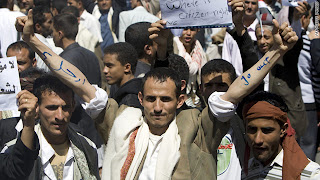Follow the story of Yemen's protest. Are there any other protests in the Middle East as well that are sparked from Egypt?
To answer the second part of the question first, CNN has complied a large list of uprisings that have resulted from the Tunsinia and Egyptian protests over the past month. Uprisings are relevents in the following countries according to CNN: Sudan, Syria, Kuwait, Jordan, Iraq, Algeria, Palestinian territories, Libya, Bahrian, and Libya. Though the success of most of these uprisings has not yet come, many have become violent. Most protests are lead by youth and students who are enraged by the government or economy in the country.
Yemen, is just one specific example of this crisis. There, the protests turned violent quickily. Within the first few days, 12 were dead and many more in serious condition. Now, hundreds of anti-government protesters gathered Sunday near a university at the Yemeni capital for a 10th consecutive day, witnesses said on February 20th. Some of them chanted, "First Mubarak, now Ali," referring to Yemeni President Ali Abdullah Saleh and Hosni Mubarak, who recently resigned as president of Egypt after nearly 30 years in power. Pro-government demonstrators were also gathering near Sanaa University, according to Adnan Al-Nahari, a student at the campus. So far nothing else has been accomplished.
This week in class:
This week, take samll occasions when you have the oppurtunity to speak up, go for it. Then in your journal, write about how it went. What did you learn? Give yourself feedback.
This week was a busy week for me. Finishing my first day of softball tryouts today and interviewing for leadership a few days ago are two highlights where I was put in a position where I had to speak up. During interviewing for leadership, I was required to ask a question every interview. It's not that I minded asking a quesiton, and by the third interview I was having so much fun I didn't even notice. But the first interview I was so nervous...I don't know why I but I felt like I was being interviewed. I was so awkward and did not make that interview any easier for the girl I was interviewing...but once I broke through and became confident, I can confidently say my interview room was very successful. The same thing happened in my softball tryout today. Once I finally broke through and "stepped up," during the tryout, my confidence skyrocketed. My performance increased because I was calm and focused.
I think the main thing I learned from these two experiences was that stepping up gives one a sense of accomplishment, and that accomplishment leads to confidence and better actions. Confidence is something that I lack in from time to time, and finding the amount of confidence needed is not always there. With time, however, I think that that confidence barrier will wear down, and the stepping up will come naturally. This will make me a better citizen, more proactive person, and much better accomplished. Stepping up is like starting a wheel at a top of a hill, the second you get it rolling, it speeds up and speeds up as it gains momentum.
The "step up" program from the University of Arizona would make for a great capstone project, especially for incoming freshman and sophomores. However, I personally don't like how it is catared to student athletes. It should be catered to everyone. The idea is great, the implementation of it is lacking. With a little work I think this program is something that could be very effective and also greatly needed in high schools today.
Question for next week:
Find a TED talk that is particularly interesting to you. What is it? Why did you pick it? What can be done with it?
Sources:
Heroic Imagination Project — Transforming Compassion into Heroic Action. Web. 21 Feb. 2011. http://www.heroicimagination.org/.
"N. Africa, Mideast Protests – Gadhafi: I'm Still Here – This Just In - CNN.com Blogs." This Just In - CNN.com Blogs. Web. 21 Feb. 2011. http://news.blogs.cnn.com/2011/02/21/live-blogging-north-africa-middle-east-protests/?iref=allsearch.
"Strategies for Effective Helping | Students." STEP UP! A Prosocial Behavior / Bystander Intervention Program for Students. Web. 21 Feb. 2011. <http://www.stepupprogram.org/students/strategies/>.
